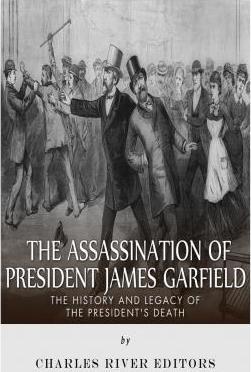The Assassination of President James Garfield: The History and Legacy of the President's Death

The Assassination of President James Garfield: The History and Legacy of the President's Death
*Includes pictures *Includes accounts of the assassination and trial *Includes online resources and a bibliography for further reading *Includes a table of contents "This is not murder. It is a political necessity. It will make my friend Arthur president, and save the republic. ... I leave my justification to God and the American people." - Charles Guiteau In 1880, Civil War veteran James Garfield was running as a Republican for president, and one of his supporters was a man named Charles Guiteau, who wrote and circulated a speech called "Garfield vs. Hancock" that aimed to rally support for the Republican candidate. Though few knew it, Guiteau's family had already deemed him insane and attempted to keep him committed in an asylum, only to have him manage an escape from confinement. Garfield went on to narrowly edge Winfield Scott Hancock in the election, and Guiteau, harboring delusions of grandeur, believed he had helped tip the scales in Garfield's favor. As such, he believed that he was entitled to a post in Garfield's nascent administration, perhaps even an ambassadorship, and he continued to rack up debts while operating under the assumption that he would soon have the government salary to pay them back. However, despite lobbying around Republican headquarters in New York City and even approaching Cabinet members, no post was forthcoming for the troubled man. Eventually, in May 1881, Secretary of State James Blaine told him to never show up again. Enraged by the perceived slight, Guiteau bought a revolver and plotted to kill the president. He got his chance on July 2, 1881 at a railroad station, shooting Garfield in the back twice and bragging to the authorities, "I am a Stalwart of the Stalwarts...Arthur is president now!" In reality, Garfield would live for nearly 3 more months, and the poor standards of medical care in the 1880s would end up being responsible for the fact he did not survive wounds that he would've survived at the end of the 19th century. Indeed, Guiteau would cite medical malpractice at trial, stating, "I deny the killing, if your honor please. We admit the shooting." Those kinds of statements and his generally odd behavior helped ensure Guiteau's lawyers would claim he was insane, one of the first high profile attempts to use that as a defense against a crime. However, that never had much chance of succeeding, and claims of insanity were heartily rejected by prosecutors. George Corkhill, a D.C. district attorney and member of
PRP: 56.11 Lei
Acesta este Prețul Recomandat de Producător. Prețul de vânzare al produsului este afișat mai jos.
50.50Lei
50.50Lei
56.11 LeiLivrare in 2-4 saptamani
Descrierea produsului
*Includes pictures *Includes accounts of the assassination and trial *Includes online resources and a bibliography for further reading *Includes a table of contents "This is not murder. It is a political necessity. It will make my friend Arthur president, and save the republic. ... I leave my justification to God and the American people." - Charles Guiteau In 1880, Civil War veteran James Garfield was running as a Republican for president, and one of his supporters was a man named Charles Guiteau, who wrote and circulated a speech called "Garfield vs. Hancock" that aimed to rally support for the Republican candidate. Though few knew it, Guiteau's family had already deemed him insane and attempted to keep him committed in an asylum, only to have him manage an escape from confinement. Garfield went on to narrowly edge Winfield Scott Hancock in the election, and Guiteau, harboring delusions of grandeur, believed he had helped tip the scales in Garfield's favor. As such, he believed that he was entitled to a post in Garfield's nascent administration, perhaps even an ambassadorship, and he continued to rack up debts while operating under the assumption that he would soon have the government salary to pay them back. However, despite lobbying around Republican headquarters in New York City and even approaching Cabinet members, no post was forthcoming for the troubled man. Eventually, in May 1881, Secretary of State James Blaine told him to never show up again. Enraged by the perceived slight, Guiteau bought a revolver and plotted to kill the president. He got his chance on July 2, 1881 at a railroad station, shooting Garfield in the back twice and bragging to the authorities, "I am a Stalwart of the Stalwarts...Arthur is president now!" In reality, Garfield would live for nearly 3 more months, and the poor standards of medical care in the 1880s would end up being responsible for the fact he did not survive wounds that he would've survived at the end of the 19th century. Indeed, Guiteau would cite medical malpractice at trial, stating, "I deny the killing, if your honor please. We admit the shooting." Those kinds of statements and his generally odd behavior helped ensure Guiteau's lawyers would claim he was insane, one of the first high profile attempts to use that as a defense against a crime. However, that never had much chance of succeeding, and claims of insanity were heartily rejected by prosecutors. George Corkhill, a D.C. district attorney and member of
Detaliile produsului










